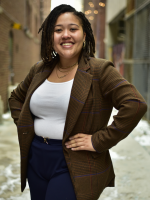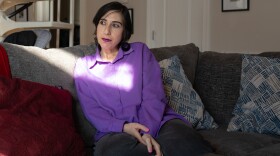Priyanka Shetty was a graduate theatre student when white supremacists rallied at the University of Virginia in Charlottesville, protesting the removal of a Robert E. Lee statue on campus just before the start of the fall semester. Dozens of people brandishing Confederate flags and lit tiki torches surrounded the statue. The next day, counter-protestors collided with the neo-Nazis demonstrators. One woman died after a white nationalist plowed into her and others with his car.
In the years that followed, Shetty turned the rally, its aftermath and the civil trial into a one-woman play called “#Charlottesville.” She’s bringing it to Louisville next week for one night only. Shetty used personal accounts from people who took part in the rally as well as others who were affected by it to tell the story on stage.
At her university, she said she noticed “something odd.”
“I expected there to be a lot of conversation,” Shetty said. “I expected a banner flying in front of our department in solidarity with the people of Charlottesville. But I soon realized that from where I was, it felt like we're not going to talk about this. We're going to go on with life as it was before, and pretend like nothing happened. ”
She said she expected some local artists and playwrights to have an “artistic response.” A year passed, and she said nothing more happened until Shetty met Moises Kaufman, the director of “The Laramie Project”.
That play depicts the impact of the hate crime murder of Matthew Shepard, a gay man who was brutally beaten and tortured in 1998. Kaufman and a group of thespians went to Laramie, Wyoming and interviewed residents to create the play.
“It was kind of like a light bulb moment for me that, ‘Oh, if that is the way that I end up capturing what happened in Charlottesville, where the voices in the play are community-centered, rather than my voice, then I could see myself as the medium for bringing this play to life,’” Shetty said.
Shetty said she was hesitant to be the first in the city to create a production about the rally.
“I felt like no one was stepping up, and I honestly didn't feel like I was the right person to write about it, because what did I know? I was this international student from India, and I didn't know much about Charlottesville history or American history, for that matter,” she said.
For several weeks, Shetty met community members that were part of the counter protests.
“Before I knew it, there were over 100 interviews. And in hindsight, now I see that I'd spoken to quite a few key people, not just witnesses of the events of Aug. 11 and 12, but also plaintiffs who ended up being in the civil trial,” she said.
In the 2021 civil trial, a jury found a group of white nationalists liable for the violent demonstration in Virginia. Shetty said she used the trial transcripts, dark web content about neo-Nazis, and social media posts from some of white nationalists to finalize the play.
“I found online ‘Normies guide to alt-right.’ This is something the Daily Stormer had posted for people who wanted to learn about being a neo-Nazi or a member of the alt-right. So yeah, it's years and years of research distilled into 70 minutes,” she said.
Eight years later
Nearly a decade after the “Unite the Right” rally, Shetty said her performance on the anniversary this year was challenging.
“The weight of it definitely came crashing down because something about when you're playing a character, there's a little bit of a distance between the actor and the role that you're playing and your own personal self,” she said. “But that day, that sort of distance from it definitely broke down, and I remember being such a tearful mess at the end of the performance.”
As the curtain closed, Shetty said she was reminded of Susan Bro, the mother of Heather Heyer, who was killed when an alt-right protester drove a car into a crowd of counter-protesters. Shetty interviewed Bro for the production.
“I've spent a lot of time with the people I've interviewed, and know them as you know some of them as friends now, and the fact that they have to go through this every single year, no matter how many years pass, it's still very raw for them, and I think that is something that did affect me,” Shetty said.
She said she is honored to share the stories, thoughts and beliefs of people affected by the events in Charlottesville.
Shetty has performed a version of “#Charlottesville” since 2018. She said she periodically alters the script or production if new information becomes available. She said the play will never be “old news.”
“A lot of what transpired in Charlottesville was basically a preview and a precursor to everything else that has happened since then,” she said.
Shetty said she sees a “direct correlation” between alt-right beliefs and current federal policies.
Shetty will perform “#Charlottesville” in Louisville at Actors Theatre on Sept. 14. There will be two performances and a panel discussion after each one with Shetty and Louisville social justice advocates.
Correction: This story has been updated to reflect that the play is 70 minutes long.







